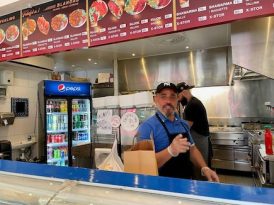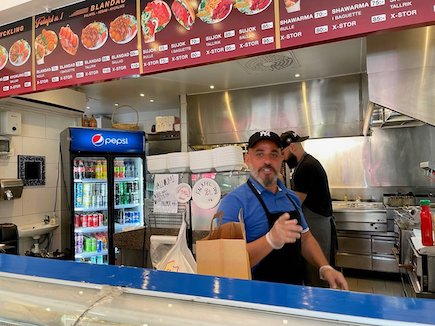By Dale Gavlak | Catholic News Service
MALMÖ, Sweden (CNS) — A visitor coming from the Middle East to Malmö could feel quite at home with great falafel lovingly made by proud Palestinian owners of Falafel No. 1, reputedly the best offered in Sweden. Or a visitor could buy Arabic, Turkish, Indian and other foreign foodstuffs from a mall in Rosengard, a district drawing a vast array of ethnicities and migrant communities.
Home to more than 170 nationalities among its 350,000 inhabitants, this multicultural city on Sweden’s southern coast has drawn refugees fleeing conflict and religious persecution at home.
But now Sweden’s newly elected government is proposing to tighten restrictions on immigration, threatening asylum-seekers’ hopes of a safe haven. In the past, Sweden has been viewed as Europe’s most welcoming country for refugees.
Afghans here who have firmly established Christian convictions and professions of faith attested to by their churches told Catholic News Service they feel particularly vulnerable as they struggle to be granted asylum in Sweden. Rights activists familiar with the challenges Afghans face with migration in Sweden point out there is a 4-5 times greater risk of rejection for Afghan adults, even young adults, compared to those who are still under 18.
The change in migration policy due to the election comes as Open Doors, a leading persecution research watchdog, warns that Afghanistan is now the most dangerous place in the world to be a Christian. This follows the militant Taliban takeover of the country in August 2021 in the wake of the abrupt U.S. military withdrawal. So, any return there would likely mean certain death, as would a return to neighboring Iran.

“We have already noticed that most political parties have changed their attitude toward immigration,” Swedish Cardinal Anders Arborelius told CNS. “It has become much more difficult for refugees and asylum-seekers to get permission to remain in Sweden. It can also be difficult for religious sisters to get permission. Still, we hope that the new government will listen to the voice of the churches and be more open to migrants from different parts of the world.”
Bishop Saad Sirop Hanna, the apostolic visitor for Chaldean Catholics in Europe, who is based in Sweden, told CNS it remains unclear whether the new government’s proposals would be accepted by parliament.
“There is concern because some of the parties are a bit from the extreme right-wing, which they say are anti-refugees. We have to see the different laws that they are going to take. Maybe in six months to a year, we will understand if this government will do good or not,” Bishop Hanna said.
Rights activists say they expect the migration policy will suffer under the new government. Asylum-seekers, they said, already face tough examinations, resulting in some of the lowest numbers in Europe being granted asylum.
Recently, Sweden’s ruling coalition arrived at a deal to set far-reaching policies on migration with the Sweden Democrats, who have neo-Nazi roots and who won the second-largest number of parliamentary seats in September’s national elections, giving them substantial influence.
The Tidö Agreement proposes to drastically reduce the quota of refugees coming into Sweden from 5,000 per year to just 900. It advocates the possible return of people who have “not integrated” and ending the permanent residence permit system.
John Stauffer, the legal director and deputy executive director of the Stockholm-based Civil Rights Defenders organization, told The Local, an online publication, the deal makes “it more difficult to be a refugee or asylum-seeker.” He pointed to concerns over stop-and-search zones, easier surveillance, stripping newly arrived immigrants of many benefits, and the detention of asylum-seekers while their asylum applications are processed.
The young Afghan men CNS met came to Sweden in 2015 as unaccompanied minors from Iran, where they initially fled from family after each experienced a deep personal encounter with Jesus. They caught boats to cross the Mediterranean, traveling first to Greece, then onward to Sweden.
They said they were forced to flee their homelands due to death threats from family and community members because of their faith in Jesus, so they sought what they thought was sanctuary and religious freedom in Europe.
One man experienced a life-saving intervention during a difficult birthing and delivery, in which mother and baby were expected to die. A Christian friend encouraged the man to pray to Jesus, and his family lived.
Another said he saw himself in darkness when a powerful light invaded his room, and he witnessed the symbol of crosses covering his hands. Already disillusioned with what he witnessed of religious expression imposed by his strict family, he became rooted in Christ. Yet another experienced persecution from his family, but his newfound faith in Jesus and prayers provided peace as well as a sudden and total release from smoking and medication addiction after he arrived in Sweden.
Now, their families and friends back home and friends in Sweden know of their Christian commitment and outspoken faith. Returning home would mean certain death.
“It has been a painful issue that some Christian converts have been denied asylum in Sweden,” said Cardinal Arborelius. “Some of them had to pass through a strange process in order to show that their conversion was sincere. We know that it could be easier for them to be granted asylum in certain other countries that are more open to their needs.”
“I think such people have to hold firm to their faith,” said Bishop Hanna. “Faith is a very deep issue known alone to God. However, there is no Christian country. There is Christianity in this country. They need to hold on to their faith and find a way to be integrated into this society.”






















